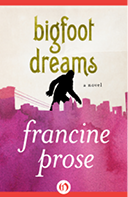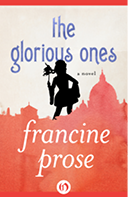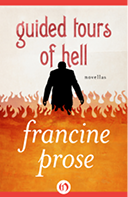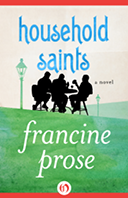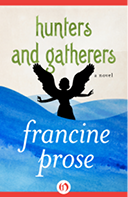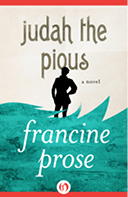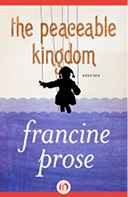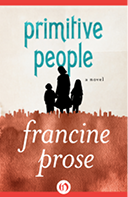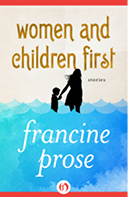Primitive People (29 page)

They all heard the bathroom door close. No one moved or said a word. The whole kitchen seemed to hum softly, some hum from the depths of the house, to which the refrigerator added a ratlike squeal Simone couldn’t remember hearing.
Kenny said, “Fuck Shelly, that lying motherfucking bitch.” He stood up and grabbed his jacket and stormed out of the house.
Simone and the children remained at the table. Maisie twisted a coil of hair and ran her finger along the dry ends. George poked at his chewed-over turkey with such concentration you would have thought the solution to their dilemma lay beneath that gristle and skin. Simone fought the urge to tell him not to play with his food. It was Rosemary’s voice she imagined, coming from her mouth, and this seemed the clearest sign yet of how mixed up everything was.
Maisie said, “Kenny forgot his present. We’ll have to save it and give it to him.”
Out of some reflex, Simone said, “That’s very nice of you, Maisie.” George looked stricken, as he had since Rosemary left the table. Simone thought: He will feel better if he washes his face. But selfishly, she didn’t want him getting up from the table. Neither Simone nor Maisie nor George wanted the others to leave. This was what they had learned in the forest: Keep together. Keep quiet. Don’t move.
In the chalky winter light the children’s faces were tense. They had reverted completely to what they were when Simone arrived. There was no sign of her having been here, of her having helped the children. They were Rosemary and Geoffrey’s children, that was the story of their lives, and in a short time their Haitian caregiver would come to seem like a minor character. Simone saw the children’s lives as cold clear oily water that would rush in and fill the empty space created by her absence.
Simone said, “I want to tell you something. You are thinking this is your life, but your life will change. You are thinking you will always be children, but you will grow up. You can decide how late to stay up and what you want for dinner. You will not always live with your parents. You can go to another country—”
Simone stopped, appalled at herself. Now she
did
sound like Rosemary, lecturing the children on the subject of their own childhood. And what was she telling them? They had already decided what they would eat and when they would go to sleep. These were not their problems. Their problem was that they would soon be propelled into a whole other life and there was no way they could stop it, nothing they could do.
No one spoke for a long time. Somewhere, far off in the house, chimes struck. Rosemary did not return. From where they sat, they would have heard if she had come out of the bathroom.
Finally George said, “Hadn’t you better go check on Mom?”
They all knew too much time had passed; something had to be done. Simone got up and walked slowly down the hall. She stopped and listened at the bathroom door.
“Rosemary?” she said. “Mrs. Porter?” There was no reply. She hesitated, then knocked on the door with a light tap in which anyone could have heard how alarmed she was.
“Come in,” Rosemary said.
Simone opened the door too fast. A hot cloud of steam wet her face.
Rosemary was standing by the sink. She was naked and dripping wet. She turned and held out her palms to Simone. Blood ran down her forearms and in watery rivulets down her pale belly. There was blood all over the bathroom. Bright scarlet marbled the veiny tiles and blotched the dirty towels. It was stunning what a spectacular mess a little blood could make. The light tube over the mirror buzzed, a dying-insect hum. Rosemary showed Simone her wrists and studied them with diagnostic scrutiny, as if the two of them were doctors consulting on an emergency case.
She had made a cut across each of her wrists, a surface scratch with a razor. She seemed understandably awestruck by how much blood had flowed. But Rosemary wasn’t in mortal danger; one wrist had almost stopped bleeding. Simone had to watch the other before she saw blood well up. Rosemary’s cutting her wrists had not been serious, just a raging, impotent gesture—like Joseph’s throwing beer bottles, but more like throwing them at yourself. If you intend to kill yourself, you don’t do it during Christmas dinner and leave the bathroom door unlocked and say “Come in” when someone knocks.
“I meant to do it in the shower,” Rosemary said, “but the shower felt so wonderful I could almost find a reason to go on living.” The towel she’d wrapped around herself was bloodstained, wet, too small. “Of course, the second I got out of the shower, things got a little more urgent and suddenly it felt like an—I don’t know—a now-or-never situation. They always say that cutting your wrists isn’t the way to do it, but of course you never believe them until you try it yourself.”
Rosemary was not in danger, and it was good that Simone knew that and knew that what she had to do was get Rosemary cleaned up and the place in some kind of order before George and Maisie saw it. There was blood on the unscrewed tube of the children’s bubble-gum toothpaste. Simone should go to the children—they would be very worried. She should tell them some reassuring half-truth, then come back and help Rosemary.
Rosemary held out her hands to Simone. There was no way for Simone to refuse them. She braced herself not to mind the clammy wetness or Rosemary’s blood. Rosemary’s hands rested lightly in Simone’s upturned palms. They stood like that for a very long time, looking past each other, not moving. Simone felt that to remove her hands would hurt Rosemary severely, and for one giddy moment feared they would stay like that forever.
At last they heard footsteps and a knock on the door. Simone used the distraction to disengage her hands. Another knock followed. Rosemary wrapped her arms around herself and looked, terrified, at Simone.
“Mom, are you okay in there?” George’s high voice trembled on the other side of the door.
Rosemary said, “Mommy’s got a touch of stomach flu. We’ll be out in a minute.”
There was a moment of hesitation while George weighed this information. Then he said, “Kenny said to tell you that he had a terrific time, and he was sorry he had to split.”
It took Simone a moment to realize this hadn’t happened. She had been there when Kenny left, and he had said no such thing. George must have wanted to console his mother about the Christmas being ruined. George must have thought he caused it, blurting out the truth about Shelly. It was a good little lie, a commendable lie—but a lie nonetheless. Simone had never heard George lie, but clearly he had the knack, he had picked it up automatically, grown it, like adult teeth. It was the longest, most extroverted sentence she had ever heard him utter, and its being a lie disturbed her as much as Rosemary’s blood.
Neither Simone nor Rosemary breathed till they heard George leave. Then Rosemary clasped her hands and said, “Thank you, Lord, for not letting George walk in. It would have blown the poor child’s mind forever and ever and ever.”
Rosemary cleared a space in the mirror and regarded herself through the smeary haze of blood and water. She said, “We look like a couple of neo-Satanist hippies or Aztec priestesses participating in some vile primitive blood ritual. We could be Sumerian goddesses, those shiny gold ones without eyes. Sacrificial spirits so scary you hit the ground when you see them, and the first things you reach for are a knife and someone else’s beating heart … Oh, God, whatever fluids I’ve lost, alcohol isn’t among them.”
Simone looked in the mirror. She watched Rosemary talking. And suddenly she had the oddest sense of having always expected to see this. She had seen this scene, or dreamed it: Rosemary naked, the tiles, the blood.
Simone caught herself and ran the hot water so she could wash the blood off her hands. But strangely, she couldn’t do it, and she stared blankly at the water. Hot water continued to spatter and cough, filling the room with more steam.
Then suddenly she remembered where she had seen all this before. Of course. It was Manet’s
Olympia,
annotated by Joseph. The naked bloody white woman, the black woman servant: differently positioned but otherwise the same.
Yet anyone who looked closer would see that it wasn’t the same. Even with Joseph’s additions, the painting was comforting compared to this. The girl in the painting was saucy and firm, reclining on her bed. Rosemary’s white flesh puckered with age as she grabbed at her slipping towel. The girl in the painting half smiled at you; Rosemary’s eyes bulged with fear. The wounds Joseph painted were elegant, like jewelry or tattoos, compared to the smeary red fingerprints turning brown on the children’s towels. A black cat sat in the painting, placid and impassive, but the pets of this house had died one by one and been buried outside by the children: shards of bone and scraps of fur decomposing under the snow. The servant in the painting was as unreadable as the cat, but Simone looked like someone having a vision of a sea of blood.
There would be more bodies, more blood. Simone understood that now. She knew what sacrificial spirits Rosemary had meant. They had followed her here from Haiti. They were giant carrion-eating crows, flying around the earth and from time to time alighting and pecking every living thing to shreds. They were everywhere, could find you anywhere; they were brutal, violent, and greedy, and every little cruelty was an offering on their altar. They were blind and evil and merciless, a sea of blood wouldn’t quench their thirst.
Staring fixedly at the bathroom floor, Rosemary said, “Dear Heloise. Perhaps you can give me some helpful advice on this embarrassing home repair problem. After my last suicide attempt we’ve had these terrible stubborn bloodstains in the grout between the bathroom tiles.”
Rosemary smiled weakly at Simone. The blood on her face looked like war paint.
“Dear God,” she said. “Who knows? My blood in the tile grout may turn out to be Shelly’s headache. Let her write the goddamn letter, get the bathroom cleaned. Let her have the problems, Geoffrey included. I will be somewhere else.”
Rosemary sat down on the edge of the tub and buried her face in her hands. “I’m thinking about the future,” she said. “That must be a positive sign.”
Francine Prose is the author of sixteen novels, including
A Changed Man
, winner of the Dayton Literary Peace Prize, and
Blue Angel
, a finalist for the National Book Award. Her most recent works of nonfiction include the highly acclaimed
Anne Frank: The Book, the Life, the Afterlife
, and the
New York Times
bestseller
Reading Like a Writer
. A former president of PEN American Center and a member of the American Academy of Arts and Letters, as well as the American Academy of Arts and Sciences, Prose is a highly regarded critic and essayist, and has taught literature and writing for more than twenty years at major universities. She is a distinguished writer in residence at Bard College, and she lives in New York City.
All rights reserved, including without limitation the right to reproduce this ebook or any portion thereof in any form or by any means, whether electronic or mechanical, now known or hereinafter invented, without the express written permission of the publisher.
This is a work of fiction. Names, characters, places, events, and incidents either are the product of the author’s imagination or are used fictitiously. Any resemblance to actual persons, living or dead, businesses, companies, events, or locales is entirely coincidental.
“I Can’t Help It If I’m Still in Love With You” written by Hank Williams,
©
1951, renewed 1979 Acuff-Rose Music, Inc. (BMI) and Hiriam Music (BMI). All rights reserved. International copyright secured. Used by permission. “Dark End of the Street” written by Dan Penn & Chips Moman,
©
1967, 1977 Screen Gems-EMI Music Inc. All rights reserved. International copyright secured. Used by permission.
I would like to thank the John Simon Guggenheim Memorial Foundation for its generous support.
F.P.
Copyright © 1992 by Francine Prose
Cover design by Jason Gabbert
978-1-4804-4511-6
This edition published in 2013 by Open Road Integrated Media, Inc.
345 Hudson Street
New York, NY 10014

